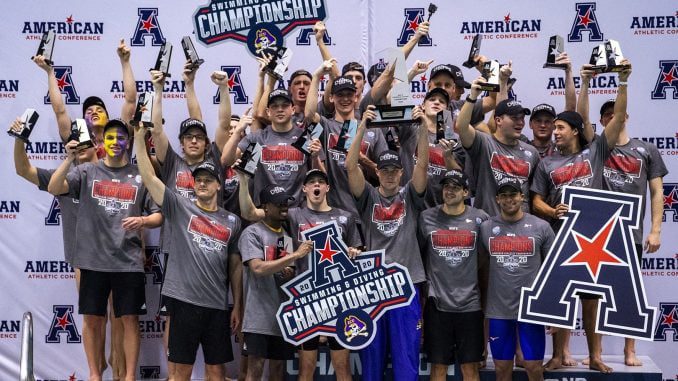
Eight months after eliminating four sports as a cost-cutting measure, East Carolina has reinstated its women’s swimming and women’s tennis programs.
The move, which was announced last Thursday, comes as part of a settlement designed to prevent a class action Title IX lawsuit in the process of being filed by a group of the school’s female athletes.
In addition to bringing back the two sports, ECU has agreed to pay the litigants’ legal fees and develop a gender equity plan that will bring the school’s athletic department into full Title IX compliance by Dec. 31, 2021.
“COVID has affected all aspects of university finance, including athletics, and in May decisions had to be made using information that we had at that time,” ECU interim chancellor Ron Mitchelson said during a Zoom conference with the media. “Some things have changed since May. While challenges remain, we are steadfast in our commitment to gender equity in our institution.”
Title IX of the Education Amendments of 1972 is a federal civil rights law that prohibits sex discrimination at any educational institution receiving federal funds.
It requires schools to provide “intercollegiate level participation opportunities for male and female students in numbers substantially proportionate to their respective enrollments.”
According to a letter sent to ECU’s administration by Arthur Bryant, the lawyer representing the athletes’ potential class action, the recent athletic cuts — which also included the men’s swimming and tennis programs — left the school well below the percentages needed to be in compliance with the law.
ECU’s undergraduate enrollment is 56.57% female, but only 50.43% of its athletic opportunities are available to females. Even with the return of the women’s swimming and tennis teams, the university will still fall short of the 70 women’s roster spots that would be needed to reach gender equity.
It’s a situation administrators hoped might be addressed through “roster management.” But according to athletic director Jon Gilbert, unforeseen factors — including the NCAA granting athletes an extra year of eligibility because of the coronavirus pandemic — prevented that from happening.
“I approached the chancellor and board of trustees in May with multiple recommendations to stabilize our department financially,” Gilbert said, adding that the decision to eliminate sports was difficult and gut-wrenching. “As part of those recommendations, we had a plan to move forward over the next year to ensure our Title IX compliance. That plan has been accelerated and modified for various reasons.
“While we were able to partially address the unprecedented financial challenges faced by the department by announcing the cuts of the four teams in the spring, we knew then as we know now that compliance with Title IX and, more importantly, meeting our commitment to our female athletes would require more action.”
It’s uncertain when or even if that further action might have taken place had ECU athletes Victoria Dixon, Meghan French, Chelsea Marstellar, Anna Otto and Randi Palandro not sought counsel and threatened legal action.
“One of the most important things I learned through this entire process is that it is up to the female student-athletes to hold colleges accountable for Title IX violations,” women’s tennis player Dixon said in a statement. “No one else is going to force your college to bring its athletic program into compliance with the law. I’m glad I stood up for myself and all female athletes at ECU and hope that women around the country will hold their schools accountable, too.”
Former ECU swimmer Lindsay Takkunen praised the efforts of the plaintiffs, saying that “they showed a lot of courage by stepping up and fighting for their right to participate in sport.” She said that their efforts have made her prouder than ever to be a Pirate.
But while she added that “a win is a win, and I’m not going to try to put a negative spin on this,” she also expressed regret that the men’s program — which won the American Athletic Conference championship last season — won’t be coming back.
Takkunen has been the driving force behind a fundraising effort to bring back both swimming and diving teams. It’s an effort she said will continue even though Gilbert indicated that ECU has no plans to add any more sports to its athletic program.
While it is still to be determined when the two reinstated programs will return to action, Gilbert said the process of hiring coaches and recruiting athletes will begin immediately. He said those previously associated with the teams before they were cut will be invited to return.
Despite the $200,000 in legal fees the settlement will cost the university and the expense involved with bringing back the two sports, Gilbert said that the athletic department is still in better financial shape now than it was previously.
“We have done an extremely good job, I think, with our staff and coaches of savings between all decisions made in the month of May — salary reductions, furloughs, operational budget savings,” he said. “I believe today we have saved north of $9 million in athletics, significant savings, but still need to generate revenue, and that is where the issue is. But I am hopeful that will be coming in the near future.”


